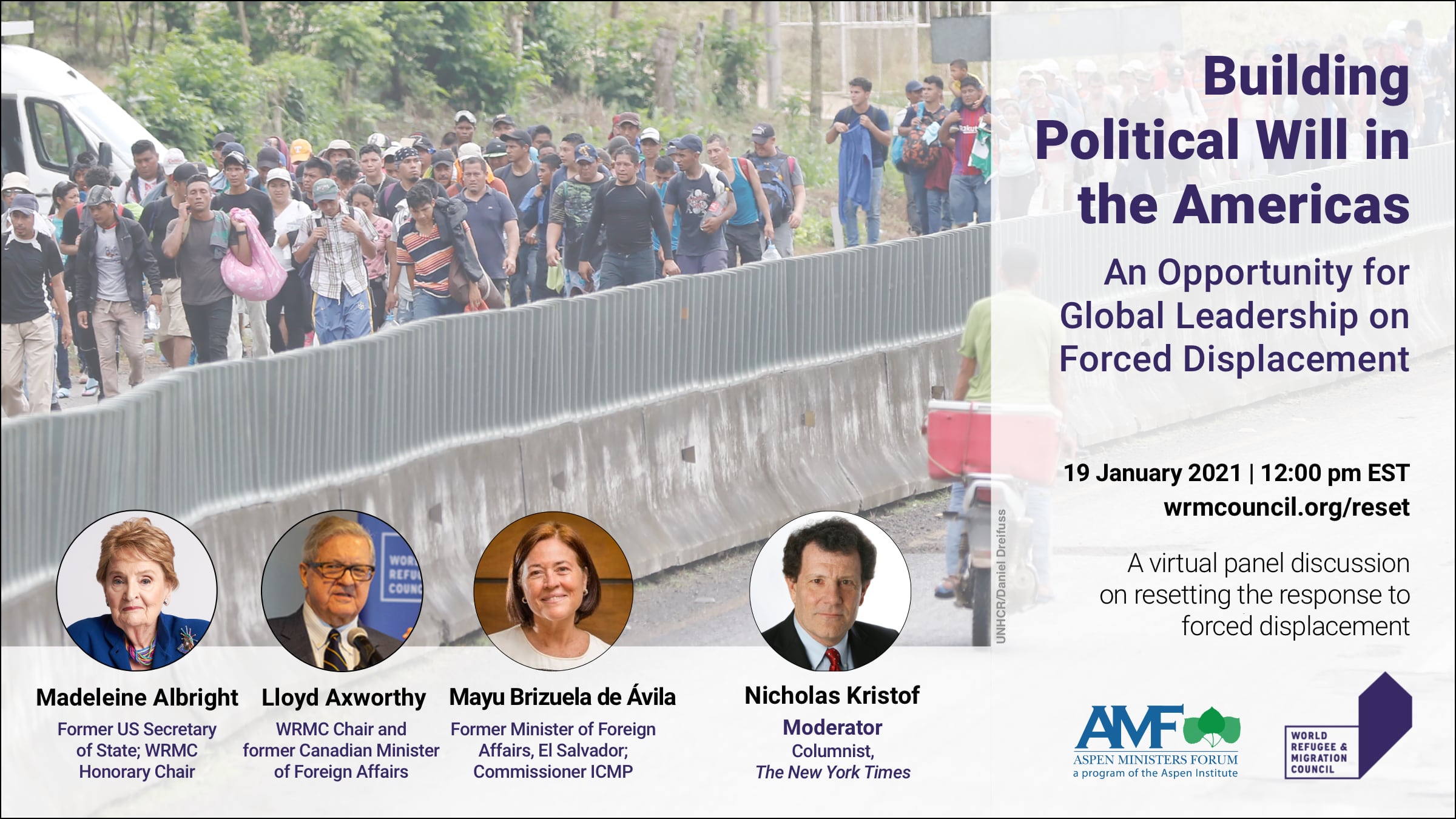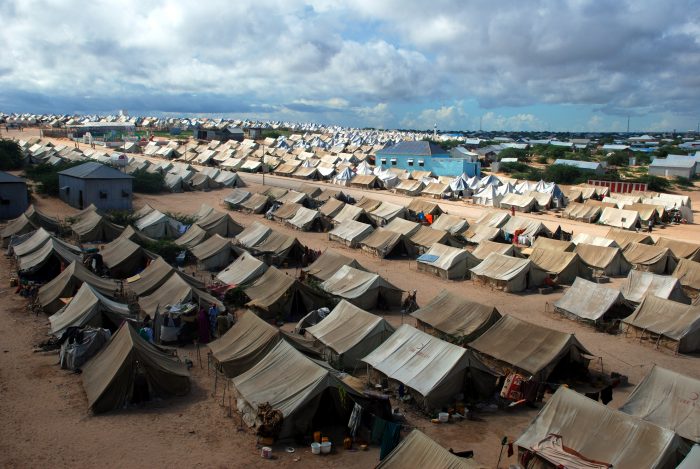In Un llamado a la acción: Transformar el sistema global de refugio our extensive examination of displacement on five continents found a global refugee system under great stress. In response, we proposed dozens of specific actions to make concrete changes to the system.
Our recommendations are as urgent and necessary today as they were when released this recommendations in January 2019.
But as troubling as matters were such a short time ago, the situation has since gone from critical to catastrophic. The plight of the forcibly displaced has become intolerable. A faltering response that was flawed and failing has now utterly collapsed. What the Council once described as an effort to repair and transform the system must now be seen as the need to rebuild it.
It is time to reset how we respond to forced displacement globally.
#ResetTheResponse through:
 political will
political will
 accountability
accountability
 responsibility sharing
responsibility sharing
 innovative financing
innovative financing
 transformative governance
transformative governance
The WRMC focuses on supporting refugee voices and leadership, gender equality and internally displaced persons, while emphasizing the impacts of COVID-19 and climate change.
Event

Building Political Will in the Americas: An Opportunity for Global Leadership
In this conversation, three leaders — Madeleine Albright in the United States, Lloyd Axworthy in Canada and Mayu Brizuela de Ávila in El Salvador — will discuss proposed domestic actions and policies as well as the international peace and security diplomacy needed to build political will and transform governance to reset the response to forced displacement.
New York Times columnist Nicholas Kristof will moderate the event, which is being hosted jointly with the Aspen Ministers Forum, a program of the Aspen Institute.
A NEW AND AWFUL REALITY FOR THE GLOBAL REFUGEE AND MIGRATION SYSTEMS
In the short period since our report was published, a confluence of events and conditions has led to this awful new reality. Among those events and conditions are the following:
- El health consequences of a lingering pandemic that has infected and killed millions, threatening especially on the vulnerable who reside in refugee camps and settlements;
- El financial consequences of the pandemic, as economies shrink and countries and their citizens look inward, diminishing both the will and the capacity to address the growing financial needs of the displaced;
- El political consequences of the pandemic, with resistance to migration generally and “Covid-stigma” attaching to those who seek asylum;
- A deepening crisis in global governance, reflecting the rise of authoritarian nationalism, a renegade regime in Washington, challenges to multilateralism, a dysfunctional Security Council and a widespread weakening of international institutions; and
- The accelerating effects of global warming and the increased frequency of extreme weather events, uprooting greater numbers and rendering their lands uninhabitable.
THE FAILURE OF THE GLOBAL REFUGEE RESPONSE
The signs and symptoms of the collapse of the current international framework for dealing with the forcibly displaced are everywhere in evidence, and are not confined to just one region.
- In Lebanon, where one in four is a refugee, chronic government corruption combines with growing economic instability to undermine the spirit of sharing and caring that has accommodated asylum seekers for decades.
- In Greece, shocking conditions of confinement cause trapped refugees to rise up in desperation, leading, in turn, to a repressive reaction from the authorities.
- In Bangladesh, the government openly talks about the forced relocation or even return to Myanmar of the hundreds of thousands of Rohingya refugees on its territory, entirely without involving the refugees in such a decision, and with no assurance of their protection or safety.
- In Turkey, the government treats refugees as pawns in a cynical game of politics. It threatens to allow refugees into neighboring Greece, with which it is quarrelling—not to recognize the refugees’ desire to travel, but rather to spite its political rival and retaliate for real or imagined slights, all the while endangering the refugees themselves.
- In Europe, the EU fashions a “policy on migration” that is a thinly disguised strategy for a circular route — refoulement in all but name — that will send asylum seekers right back to the limbo they are trying to escape.
- In Iraq, thousands of Yazidi refugees left entirely without protection struggle bravely to go “home”, coping with resistance from government and violence from non-state actors, as well as a terrain littered with unexploded land mines. There are no offers of support from any quarter.
- In the Western hemisphere, unresolved crises in Venezuela and Central America swell the number of refugees, placing unmanageable burdens on host communities struggling to do their best without the assistance they require from others.
- Worldwide, there is a dramatic drop in the rate of resettlement, leaving refugees caught in place, captive to circumstances they cannot control, and enduring conditions they cannot long survive. Prey to the pandemic, they do without even basic health care, and the toll especially for women and girls is horrific.
All of this is occurring in a climate of international indifference, with nary a word of protest, nor a call of conscience, from either a state or a leader ready to stand up for the fundamental principles of humanity and protection that underlie the ancient and inalienable right of asylum.
In fact, every one of the weaknesses and all of the flaws identified in Un llamado a la acción: Transformar el sistema global de refugio has widened and worsened in the time since publication. For instance:
- Responsibility sharing is rarely acknowledged and largely ignored.
- None of those who are evading their part in our collective responsibility towards the forcibly displaced is being held to account.
- Funding for refugees and the internally displaced, always far short of what is needed, has diminished even further.
- Refugees are acted upon, having no voice of their own and offered no place at the table. Far from being heard, they are systematically silenced, their needs regarded as a burden to be shifted rather than a responsibility to be shared.
WHERE DO WE GO FROM HERE?
To address these problems, our Council continues to advocate for the concrete, practical recommendations we made in our call to action. The system is breaking, if not already broken, and in this climate the Council strives to create avenues to advance people’s knowledge and capacity to understand and address the needs of, and conditions endured by, forcibly displaced people by:
- gathering data, conducting research and making available to the public, data, reports, and analyses by academics and other subject matter experts on ways, tools and approaches to improve the conditions endured by forcibly displaced people; and
- holding conferences, workshops, consultations and events focused on ways, tools and approaches to improve the conditions endured by forcibly displaced people.
